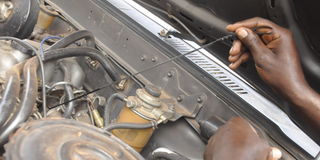Ask the Mechanic

Servicing entails short term checks which happen during the routine oil and filter service. PHOTOS/Isaac Ssejjombwe
What should I consider during service?
What aspects are considered during servicing of a vehicle? I need this information to make sure that servicing is fully done when I take my vehicle for servicing.
Peter Segonga
Hello Peter, when servicing a vehicle one should consider the manufacturer’s recommended, service interval for example 5,000 kms, suitable oils or fluids according to viscosity or performance and where to find genuine or reputable service parts such as filters.
Different car manufacturers will suggest a maintenance schedule which highlights important routine and non-routine service actions.
However you can have your generic schedule which addresses short term checks; long term checks and seasonal checks.
Short term checks happen during the routine oil and filter service. Depending on the oil type (fully/semi synthetic or mineral grade), age and condition of your engine, a technician ought to recommend the oil drain interval for example 3,000, 5,000 or 7,000 kms. Engine oil and filter are renewed.
The short term fuel filter for older diesel engines and air cleaner element should be replaced if found dirty. Most modern cars have long life fuel filters. Other fluid conditions and quantities to be inspected include brake, steering, coolant and transmission to confirm need for top up or why the level has dropped.
For instance, brake fluid drop could suggest a leak or brake pad wear.
Technician should have a quick look at serpentine belts, and engine seals for leaks. A glance at the tyre pressure and condition of side walls and treads is recommended. Round it off with an inspection of the dashboard for fault lights as well as operation of basic warning electrical equipment like horn and lights.
Long term service checks include all the above and special long life fluids (drain and refill) and filters eg gearbox oil, fuel filter, differential oil, engine coolant and brake fluid (not top up).
Inspect suspension components, final drive propellor and drive shafts. Inspect brake lines and pistons. Inspect electrical components and round off with a computor diagnosis to detect possible malfunction.
Seasonal service is geared towards components crucial for some seasons such as the rainy one.
Here, you consider wipers and tyres in preparation for wet season.

Why does the ABS light stay on?
I drive a Land Cruiser Prado TX. For the past one month, I have noticed that the ABS light on the dashboard lights when driving and sometimes stays on, especially in the mornings. At other times, it does not come on. Is this something to worry about? What could be the problem and how can it be resolved.
Charles T, Gayaza
Hello Charles, the ABS (Antilock Braking System) on your car may have a faulty, improperly fitted or a dirty wheel speed sensor. Occasionally it can be a damaged relay or modulator.
The best way to pinpoint the intermittent fault is by use of a car diagnostic computor.
ABS is designed to help you stop the car safely without skidding, especially on wet surfaces. ABS relies on an electric and hydro mechanical modulator to monitor each wheel speed using ABS sensors.
In modern cars with Electronic Brake Distribution (EBD), ABS will deliver unique brake force to each wheel depending on how faster the wheel is moving compared to others and the likelihood to cause car spin. For your safety do not ignore the ABS fault light on the dash board.
Is it safe to drive a car with ABS light on? Driving with the ABS Light on is not a good idea because it means your ABS is not working properly. This means your vehicle may not handle like it is designed to under heavy braking. If both your ABS Light and brake system light come on, this is an emergency and you need to stop driving right away.

My overhauled the D4D engine on my Toyota Quantum it releases white smoke every morning
I have overhauled the D4D engine on my Toyota Quantum. But it releases white smoke every morning when I start it. During the day, when it is hot, there is no smoke. I need help, what could be the problem? Advice
Sekome
Hello Sekome, white smoke emitted from the exhaust after cold starts and during cold runs only can be caused by a bad cylinder head gasket leaking engine coolant into the combustion chamber (even after an overhaul).
The white smoke could also be caused when diesel fuel isn’t reaching the temperatures required to burn. This could be caused by faulty fuel injectors, incorrect injection timing and low engine cylinder compression.
The D4D engine in your Toyota Quantum is in the category of hi tech turbo Diesel engines.
The common rail diesel injection technology requires high emission standards while operating at pressures and temperatures much higher than the older Diesel engines.
Any slight variation from normal operating conditions will affect the fuel and emission systems.
You need to have the car inspected and a diagnostic check carried out to evaluate faults and decide whether one of the fuel or emission system components may have been overlooked during engine overhaul.
Send sms: mycar (space) your comments and questions to 6933
Or email them to: [email protected]




